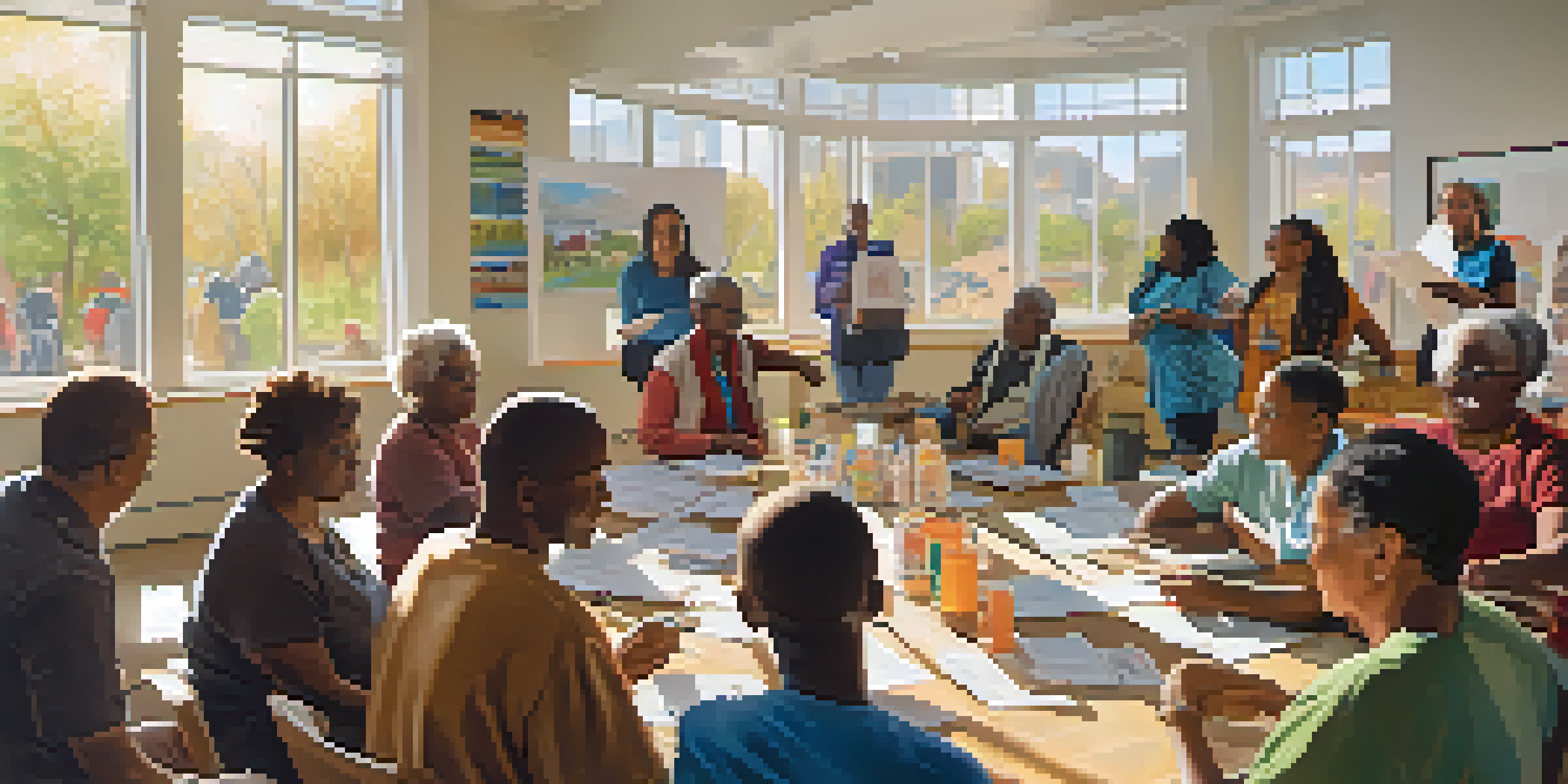Exploring the Benefits of Health Literacy in Communities

What is Health Literacy and Why It Matters
Health literacy refers to the ability to access, understand, and use health information effectively. It’s not just about reading pamphlets; it's about making informed decisions that significantly impact one's health and well-being. In communities, improved health literacy can lead to better health outcomes and reduced healthcare costs.
Health literacy is the ability to obtain, process, and understand basic health information and services needed to make appropriate health decisions.
When individuals understand their health conditions and treatments, they are more likely to follow medical advice and engage in preventive care. This understanding helps bridge gaps in communication between healthcare providers and patients, fostering a more collaborative approach to health. Overall, health literacy empowers individuals to take control of their health.
Moreover, a community with high health literacy is more resilient, as residents can navigate health systems and advocate for necessary resources. As such, investing in health literacy is not just a personal benefit; it’s a community-wide advantage that can lead to a healthier population.
Improving Health Outcomes Through Engagement
Engaging community members in health literacy initiatives has shown to improve health outcomes significantly. For instance, programs that involve workshops on nutrition or chronic disease management can lead participants to make healthier choices. This proactive engagement fosters a sense of ownership over personal health.

Additionally, when communities collaborate on health literacy projects, they often see a ripple effect. People start sharing information with friends and family, creating a culture of health awareness that extends beyond the initial participants. It's like planting seeds of knowledge that grow and flourish throughout the community.
Importance of Health Literacy
Health literacy empowers individuals to make informed health decisions, leading to better outcomes and reduced healthcare costs.
The benefits are clear: as more individuals become informed about health topics, the overall health of the community improves. This, in turn, can lessen the burden on local healthcare systems, as fewer people will seek treatment for preventable conditions due to a lack of understanding.
Reducing Health Disparities and Inequities
Health literacy plays a pivotal role in reducing health disparities among different demographic groups. Communities with lower health literacy often face higher rates of chronic diseases and poorer health outcomes. By focusing on improving health literacy in these areas, we can help level the playing field.
The ultimate goal of health literacy is to empower individuals to make informed health decisions and take control of their health.
For example, targeted education programs can address specific cultural or linguistic barriers that contribute to health inequities. By providing resources in multiple languages or through community leaders, organizations can ensure that vital health information reaches everyone. This tailored approach makes health information more accessible and relatable.
Ultimately, enhancing health literacy can empower marginalized groups, enabling them to advocate for their health needs. When everyone has the tools to understand and navigate their health effectively, we move closer to achieving health equity across communities.
The Role of Technology in Health Literacy
Technology is transforming the way we access health information, making it easier than ever to improve health literacy. From mobile apps that track health metrics to online platforms offering educational resources, technology can be a powerful ally. It helps bridge gaps in knowledge and provides immediate access to reliable information.
However, it’s essential to ensure that all community members can benefit from these technological advancements. Digital literacy, or the ability to use technology effectively, is closely linked to health literacy. Therefore, training programs that teach both health and digital skills can empower individuals to navigate online health resources confidently.
Community Engagement Benefits
Engaging communities in health literacy initiatives fosters a culture of health awareness, benefiting overall community health.
As communities embrace technology, they can create interactive platforms for sharing health information. This not only enhances individual knowledge but also fosters a sense of community as people connect over shared health goals and resources.
Creating Sustainable Health Literacy Initiatives
For health literacy initiatives to make a lasting impact, they must be sustainable. This means creating programs that can continue to thrive long after the initial funding or support has ended. Community involvement is crucial in this process, as local residents can help shape and maintain these initiatives.
Establishing partnerships with local organizations, schools, and healthcare providers can provide the necessary resources and support. By working together, these entities can create a network that promotes health literacy through various channels, such as workshops, seminars, and online resources. This collaborative approach ensures that health literacy remains a priority.
Additionally, ongoing evaluation and feedback from community members can help refine programs over time. By adapting to changing needs and incorporating new information, these initiatives can remain relevant and impactful, fostering a culture of health literacy for generations to come.
Empowering Individuals to Advocate for Their Health
One of the most significant benefits of health literacy is its potential to empower individuals to advocate for their health. When people understand their health conditions, they are more likely to ask questions, seek second opinions, and make informed choices about their treatments. This empowerment leads to better patient-provider relationships.
For instance, someone who knows how to interpret their lab results can engage in meaningful discussions with their healthcare provider. This not only helps them understand their health better but also encourages providers to communicate more effectively. Ultimately, this creates a partnership focused on achieving the best health outcomes.
Technology's Role in Health Access
Technology enhances health literacy by providing instant access to information, but ensuring digital literacy is vital for all.
Moreover, empowered individuals can advocate for broader community health needs. They can voice concerns about local health services and push for improvements, making their communities healthier overall. This advocacy at both personal and community levels is essential for fostering a healthier society.
The Future of Health Literacy in Communities
As we look to the future, health literacy will continue to play a critical role in community health. With the rapid advancements in technology and healthcare, ensuring that everyone can access and understand health information is more important than ever. Communities must prioritize health literacy as a fundamental component of public health strategies.
Innovative approaches, such as leveraging social media and community influencers, can help spread health literacy messages effectively. By meeting people where they are, we can engage a broader audience and inspire action. This shift in strategy can lead to more informed communities, ultimately reducing healthcare disparities.

In conclusion, the benefits of health literacy are profound and far-reaching. By investing in these initiatives today, we can build healthier, more resilient communities for the future, where everyone has the knowledge and tools to thrive.